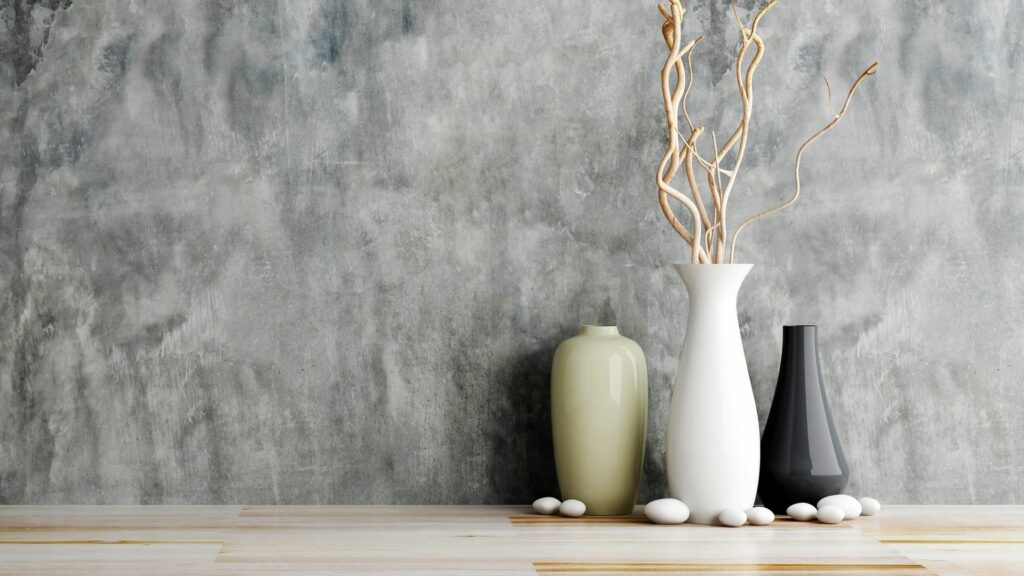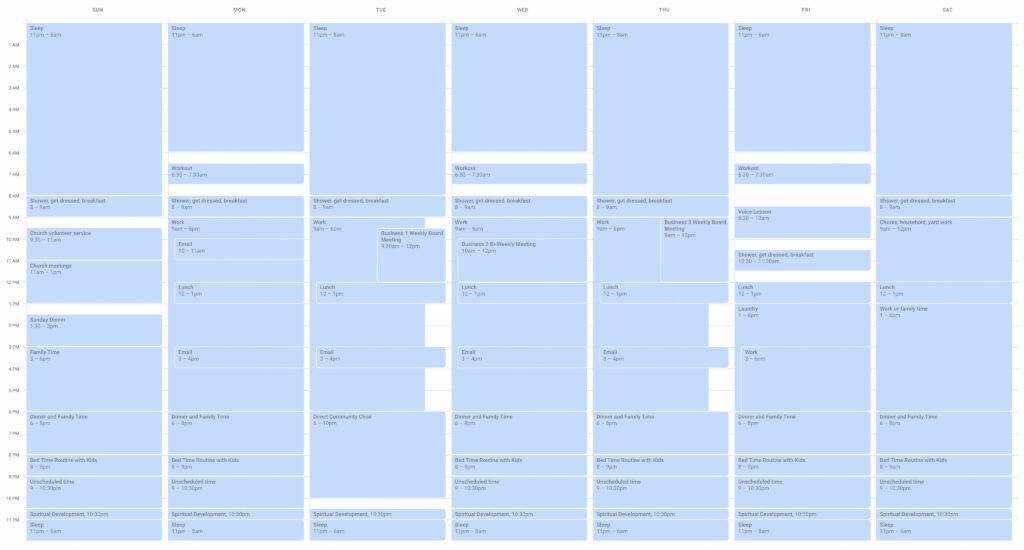
Strap in. This is a personal narrative. This isn’t an article about the 7 ways you’re going to master time. It’s more of a journal entry on the day that I had a series of epiphanies that changed my life. Maybe it’ll change your life, too. Or maybe you’ll be totally bored and feel like you wasted your time reading an article about time management. You have been warned.
That said, most people like a good story. If you’re like most people, keep reading.
Several years back, I got really overwhelmed with everything that I had going on. I felt like there was way too much to do and that the small stuff was keeping me from doing the important stuff. I decided it was time to put a little more structure around my life and I built a basic spreadsheet of all the things I was doing and should be doing. It looked something like this:
| Focus | Hrs/week | Examples |
| Work | 65 | I own several businesses. Work takes a lot of my time. |
| Sleep | 56* | Doctors recommend 8 hours a night. Ha. Ha …. ha. |
| Eat | 21* | Can we prepare, eat, and clean up a nutritious meal in less than an hour? |
| Fitness | 3 | Hit the gym for an hour on Mondays, Tuesdays, and Wednesdays. |
| Family | 14* | Two hours a day? Shouldn’t they get more? |
| Spirituality | 3.5 | I’ve got to spend time understanding my Purpose, connecting with God. |
| Personal | 14* | What about an occasional movie, or a good book? |
| Household | 7* | Yard work, taking out the trash, folding laundry, vacuuming. Yeah, we both help. |
| Church | 2 | Two hours, every Sunday. Great place to connect and recharge! |
| Community | 3 | I volunteer about 3 hours a week. |
| Relationship | 4* | I gotta stay connected with my wife! |
*These time-spenders were aspirational. For example, we’re supposed to get 8 hours of sleep at night.
Add that up … it totals to 192.5 hours. Guess what? There are 168 hours in a week. I’ve got 168 hours to get 192.5 hours of stuff done. That’s 24.5 more hours of stuff that I’m not doing. If I had eight days in a week, instead of seven, I could get it all done!
If I had eight days in a week, instead of seven,
I could get it all done!
All right, all right. Don’t be too critical of my spreadsheet or how much time I’ve dedicated to different focuses of my life. The point is, when you add what you are doing with what you should be doing, there will never be enough time.
I felt like I was a slave to my time.
But, then I had an epiphany: everyone gets the same amount of time. Time is the great equalizer. Regardless of socio-economic status, gender, age, fitness-level, race, creed, celebrity, nationality, or ethnic group, we ALL get the same number of hours a day. So I said to myself, “Self … let’s make sure we’re spending our seconds deliberately.”
It was late. The kids were asleep. I was sitting in my office at home; the one space in the house that was FULLY under my control. Everything was right were I wanted it (yes, as a designer, I’m mildly obsessive with the placement of “things” and the feng shui of a space). I admired the harmony and peace of my office and my relationship (both spatially and sentimentally) to the things that I’ve acquired.
And that’s when I had a second epiphany. Every object in my office had a place. The objects on the credenza worked together to create a tableau of balance, both in theme and in placement. My mind started racing. All of my stuff has a place.
My keys go on the hook by the door. My socks go in the bottom drawer. My dress shirts go on the top rack in the closet. My car goes on the right side of the garage. My iPhone charger goes on my night stand. My wallet goes in the drawer. The salad forks go in the left cubby. The salt and pepper shakers go in the cupboard to the right of the stove. The towels get stored in the hallway closet.
A place for everything and everything in its place! I never waste time looking for my keys because they’re either in my pocket, in the ignition of my car, or on the hook by the door. What if I treated time like it was something I owned, instead of something that owned me?
What if I treated TIME like it was something I owned,
instead of something that owned me?
Mind explosion (at least mine did).
I scrutinized my life and realized that I’m doing the same things every day. I work, eat, sleep, get dressed, answer email, work out, spend time with family, etc. If I’m doing the same things over and over, why not get better at them?! Just like I put all of my things in their place, I decided to put all I do in their place. (The grammar on that sentence is definitely iffy).
Just like I put all of my things in their place, I decided to put all I do in their place.
This time, I made a graphic of my ideal week. It looked something like this.

Ok. This might look kind of overwhelming … but look for the patterns. Monday, Tuesday, Wednesday, and Thursday look VERY similar. Friday, Saturday, and Sunday are a little more unique, BUT I’m still getting the right sleep, right meals, and right time with self and family.
I’ve found that the key is to get as many days as possible to look the same. WHY? So I don’t waste time choosing when I’m going to do something. It’s already decided! The more similar my days got, the less time I spent planning them … or worse, just letting them happen.
When we just LET time happen,
it slips through our fingers.
Yes … there are blocks in the day that we need to be unscheduled. BUT, we should be deliberate about when these blocks of time are.
As I began to make my calendar, I began to realize that in practice, I was deciding every day when I was going to get ready, eat, answer email, come home from work, spend time with my kids and wife. I always felt guilty that something or someone was getting left out. Once I decided to make similar tasks happen at similar times every day, two things happened: (1) I was getting more done, and (2) I was less stressed about it.
For example: I used to do a load of laundry every day. Sure, I was doing a little work more frequently, but it ALSO meant laundry was on my mind every single day. Now, I worry about it once a week, while I’m working from home (see Friday).
Another example: I used to read email as it came in. I was constantly being interrupted. I forced myself to ignore email until 10am and 3pm. I skim all unread emails and answer them in order of importance. The rest, gets pushed off to next time.
A third example: I used to feel really guilty about relaxing, watching a movie, or reading a book. I have a 2 hour block every day that I call unscheduled time. By default, this is time for me to do WHATEVER I WANT. I’ll do a quick inventory to make sure that I did everything that had to be done. If it can wait, then I’ll read a book, catch up on news, check in on social media (no social media at any time during the day), arrange music for my community choir, or take soak in a hot salt bath and watch Netflix.
There were benefits … I was HIGHLY motivated to take that hot bath at the end of the day, so I would be super focused on accomplishing my tasks.
My stress levels decreased because I knew I would get to the stuff that was important to me because I had scheduled time for it.
Time-wasting screen time (social media, cat videos, addictive screen-scrolling) decreased.
I don’t say, “I don’t have time” anymore. I DO have time. Time is mine, and I may or may not choose to spend it on whatever you ask of me.
I got more flexible. Even though everything looks super rigid, it’s very easy to move something around if something comes up.
My work got better. My house got cleaner. My mind got sharper. My energy got higher. Nothing was perfect … but it was better.
AND IT HAS BEEN SUSTAINABLE.
We spend 26% of our time at work,
28% of our time asleep, and
45% of our time on everything else.
According to the Bureau of Labor Statistics, an average person works 44 hours a week (26% of your time). The average person sleeps 47.6 hours a week (28% of your time). That means you still have about 76.4 hours (45%) of OTHER time.
“Oh, I could never do this. I’m too busy. I could never put this kind of control over my schedule,” you might say. If you truly believe that, you’ve wasted a lot of time reading a meaningless blog post.
The goal isn’t perfection … it’s improvement. Make your days look as similar as possible. Set an appointment with your laundry machine. Set an appointment for grocery shopping. Set an appointment for me-time. And while keeping a willingness to adapt and flow … stick to it.
Do an audit of your time. Own those 76.4 hours and do more, share more, give more, get more, and become more.